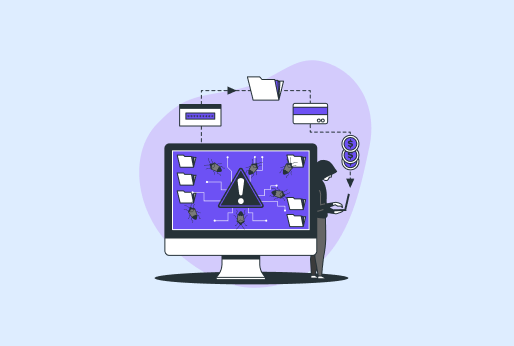
What Sparked the First Computer Virus in the Philippines?
The Philippines’ first computer virus was the infamous “ILOVEYOU” worm. It came into the picture in 2000, creating havoc from Manila to the rest of the world. This was no ordinary bug; it was the Philippines’ first virus to cause destruction in millions of computers worldwide.
Want to know how an ordinary email became an online disaster? Let’s go over the history of the first computer virus in the Philippines, from its beginnings to its enormous effect. Ready? Go!
The Origin of the ILOVEYOU Virus
The Philippines’ first computer virus began with Onel de Guzman, a 23-year-old student in Manila. He was studying computer science at AMA Computer College in 1999. Internet access was pricey back then, and Onel couldn’t afford it. Frustrated, he had an idea: create a program to grab passwords for free internet access. Sounds bold, right?
- Thesis troubles: Onel’s college project was about stealing passwords from ISPs. His professors rejected it, calling it unethical.
- From idea to chaos: Onel tweaked his code into the ILOVEYOU worm, not expecting it to go global.
- Why May 4, 2000? He sent it from his home computer, just testing it out. No master plan—just curiosity.
Onel used Visual Basic Script (VBS), a simple coding language. He drew inspiration from the Melissa virus, which spread via email in 1999. But ILOVEYOU, the first Philippine virus, was way sneakier. It played on human emotions—who wouldn’t open a “love letter”? That’s how the first computer virus in the Philippines was born, in a tiny apartment in Quezon City.
The Spread of the “I Love You” Virus
The first virus in the Philippines spread like wildfire. It started with an email titled “ILOVEYOU” and an attachment: “LOVE-LETTER-FOR-YOU.txt.vbs.” People saw “txt” and thought it was safe. Big mistake.
- Fast and furious: On May 4, 2000, it hit 45 million computers in one day—10% of the world’s internet-connected PCs.
- Email attack: The worm used Microsoft Outlook to send itself to every contact in a user’s address book.
- Global reach: From the Philippines, it spread to Hong Kong, Europe, and the U.S. in hours.
Banks in Manila froze. The Philippine Stock Exchange paused trading. In Europe, the UK Parliament’s emails crashed. In the U.S., the Pentagon and NASA faced outages. Why so fast? No one had strong antivirus software, and email was the internet’s weak spot. The Philippines’ first computer virus revealed how interdependent—and vulnerable—the world was.
Effects of the “I Love You” Virus
The first Philippine computer virus wasn’t only frustrating to individuals—it created a mess around the world. The devastation was enormous, and the consequences altered the way we deal with cybersecurity.
- Money wasted: Officials estimate $10 billion in damages globally. Ford and Microsoft, among others, spent millions of dollars repairing systems.
- Real-life chaos: Small businesses lost client information. UK hospitals had postponed procedures because of ruined records.
- Government action: The Philippines had no cybercrime laws in 2000, so Onel faced no charges at first. This led to the E-Commerce Act (Republic Act No. 8792) later that year.
The 1st computer virus in the Philippines hit hard. The Pentagon lost its movie library (yes, even unreleased films!). The virus forced companies to rethink security. Antivirus software became a must, and spam filters got smarter. The first Philippine virus taught us: don’t trust every email, and always back up your files.
How Did the ILOVEYOU Virus Work?
How did this tiny worm cause so much trouble? The first computer virus in the Philippines was clever, using both tech flaws and human nature.
- Tricky disguise: The attachment looked like a safe text file (“txt”) because Windows hid the real “.vbs” extension.
- Sneaky code: Written in Visual Basic Script, it ran automatically when opened in Outlook.
- File destruction: It overwrote photos (.jpg), documents (.doc), and music files, replacing them with copies of itself.
- Spreading fast: The worm emailed itself to all contacts in your address book, pretending to be you.
The virus also stole passwords, like Onel originally planned. It could even download extra malware, like porn or fake Windows updates. Because the code was editable, hackers made 25+ variants, each causing new kinds of damage. The first virus in the Philippines worked because people trusted emails too much—and Windows wasn’t ready for this kind of attack.
How iProVPN Helps You From Viruses
Worried about viruses like ILOVEYOU sneaking into your system? iProVPN can’t actually prevent viruses, but it’s an effective shield for your cybersecurity. By encrypting your connection to the internet, iProVPN conceals your information from hackers who could send you malicious emails or attachments. It also blocks dangerous websites that would automatically download malware. With servers based in various countries, you can browse anonymously, which makes it more difficult for cybercriminals to trace you. Pair iProVPN with good antivirus software, and you’ve got a strong defense against threats like the first computer virus in the Philippines. Stay safe, surf smart!
Conclusion
The ILOVEYOU worm, the Philippines’ first computer virus, began as a student’s experiment and culminated as a wake-up call around the world. Onel de Guzman did not intend to crash the internet, but his program demonstrated how exposed we were. From Manila to Microsoft, the Philippines’ first computer virus made an impact. It cost billions, erased memories, and prompted the world to take cybersecurity seriously.
We are smarter today; antivirus software, spam filters, and backups are our armor. But the lesson remains: don’t click on suspicious links, even if they are from “I love you.” The first Philippine virus serves to remind us to remain alert on the internet.
iProVPN encrypts your data for protection against hackers and surveillance. Unblock your favorite streaming platforms instantly with the best VPN for streaming.
Start Browsing Privately!





